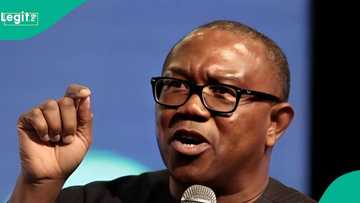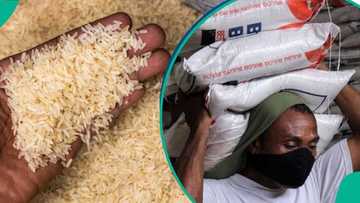Abia, Delta, Ogun, Others: Why Foreign Investors Snubbed 32 Nigerian States in 2024
- Latest data from the Nigeria Bureau of Statistics (NBS) shows that capital importation in Nigeria hit $12.32 billion in 2024
- However, the majority of states in Nigeria failed to attract foreign investment due to a myriad of reasons
- Experts say these states rely heavily on federal allocations due to limited internally generated revenue
CHECK OUT: How to Start Earning with Copywriting in Just 7 Days – Even if You’re a Complete Beginner
Legit.ng’s Pascal Oparada has reported on tech, energy, stocks, investment and the economy for over a decade.
Despite Nigeria recording a massive 215% jump in capital importation in 2024, a shocking 32 states failed to attract a single dollar in foreign investment.
From Abia to Zamfara, these states were completely sidelined as investors concentrated their funds in just a handful of regions.

Source: Getty Images
Why? The reasons range from insecurity and poor infrastructure to unfriendly policies and a lack of transparency.
Reasons for the lack of FDIs
Widespread insecurity
Insecurity remains one of the most serious threats to investment in Nigeria. States plagued by banditry, kidnapping, and insurgency—such as Zamfara, Borno, and Taraba—are viewed as high-risk zones by foreign investors.
The fear of property destruction, ransom payments, or operational disruptions keeps international businesses at bay, regardless of the sector.
Poor infrastructure
Many of the states that received zero capital importation in 2024 suffer from underdeveloped infrastructure.
From inadequate roads and power supply to poor broadband connectivity, states like Abia, Bayelsa, and Benue struggle to offer the basics investors require.
Without reliable logistics and utilities, the cost of doing business becomes unbearably high.
Weak ease of doing business
For investors, red tape is a red flag. States without effective systems for business registration, tax administration, and dispute resolution tend to be overlooked.
In many of the 32 states, investors encounter cumbersome bureaucracies, long approval timelines, and unclear regulatory frameworks—issues that deter foreign participation.
Political instability and governance concerns
Unstable political environments and inconsistent policies also scare investors away. Frequent changes in leadership or conflicting regulations can stall or disrupt investments.
States where leadership changes often lead to the cancellation of contracts or abrupt policy shifts are naturally unattractive to investors seeking stability.
Lack of investment promotion agencies
Unlike Lagos or Abuja, most of the neglected states lack dedicated investment promotion agencies or functional one-stop investment centres.
These agencies help coordinate investor relations, streamline processes, and market opportunities globally.
Their absence leaves potential foreign partners uninformed and unsupported.
Absence of strategic economic clusters
Investors often look for existing economic ecosystems—such as tech hubs, industrial clusters, or free trade zones—to minimise risk and maximise returns.
States without identifiable sectors of strength or synergy fail to provide that anchor. The dominance of Lagos and the FCT reflects their strong financial, tech, and service clusters.
Transparency and data gaps
Foreign investors rely heavily on data to assess markets. Many of the 32 states have poor public financial records, unclear land documentation, and limited data on business operations.
Without transparency or accurate records, foreign capital tends to gravitate toward better-documented and predictable markets.
A long-term pattern
It’s not just a one-time event. According to the Nigerian Bureau of Statistics (NBS), eight of the 32 states, such as Bayelsa, Ebonyi, Gombe, Jigawa, Kebbi, Taraba, Yobe, and Zamfara, have not attracted any foreign capital between 2019 and 2024.
This prolonged neglect suggests deeply rooted structural issues that will require deliberate policy reforms to fix.
Urgent reforms needed
Despite a 215% surge in capital importation in 2024, the uneven distribution highlights systemic problems at the state level.

Source: Getty Images
Unless these 32 states address insecurity, infrastructure gaps, and poor governance, they risk being permanently left behind in Nigeria’s growth story.
Relative to a previous year's report, 28 states recorded no investment in the review period.
According to new Foreign Direct Investment data released by the NBS, 28 states could not attract any Foreign Direct Investment in the quarter of 2023.
Of the 36 states in Nigeria and the FCT, only Lagos, Abuja, Adamawa, Akwa Ibom, Ekiti, Ogun, Ondo, and Niger states saw capital inflows during the period under review.
6 Nigerian states with the most foreign investments
Legit.ng earlier reported that a new report by the NBS said that about six Nigerian states and Abuja attracted foreign investments between June 2023 and June 2024.
The NBS report on capital importation for the second quarter of 2024, released by the NBS on Tuesday, October 8, 2024, disclosed that Total Capital Importation for the review period was about $8.75 billion.
The NBS report debunks President Bola Tinubu’s October 1, 2024, claim that the country attracted about $30 billion in foreign direct investment in one year. Tinubu disclosed in his Independence Day broadcast to Nigerians that the country attracted FDI worth over $30 billion in the past year.
Source: Legit.ng






